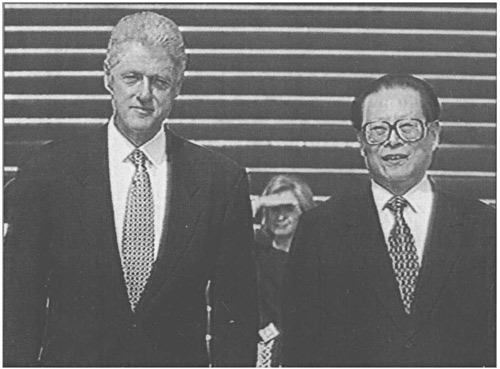|
 |
|
Chinese President Jiang Zemin welcomes visiting U.S. President Bill Clinton on June 27 in Beijing (ZHOU TU) |
Chinese President Jiang Zemin and visiting U.S. President Bill Clinton held formal talks on June 27 in Beijing. They had an in-depth exchange of views on bilateral relations and major international and regional issues and reached wide and important consensus. The talks were described as "positive, constructive and fruitful".
Jiang hailed the exchange of visits by the two heads of state within a year as representing the common aspiration of the peoples of both countries, and signifying the beginning of a new era in the development of Sino-U.S. relations. Facts showed the improvement of the relationship was an historical inevitability which no force could stop, he said.
President Clinton said it was his first visit to China, and also the first visit by an American president in nine years. It came only eight months after Jiang's visit to the United States, demonstrating the progress the two countries had made in building their constructive strategic partnership, which the vast majority of the people in the United States could only welcome. Clinton expressed the hope that his frank and open talks with President Jiang, and his trip to China, would help extend the areas of cooperation, reduce differences and increase the American people's understanding of China and Chinese people's understanding of the United States, so as to further expand the friendly partnership between the two countries.
President Jiang said peace and development were the main themes of the times, an era full of both hope and challenges. "Economic globalization has accelerated expansion of international economic cooperation and trade, while scientific and technological advances, particularly the revolution of information technology, gives new impetus to human progress and social development."
However, he said, destabilizing factors and uncertainties continued to exist in the international situation with the unjust and unreasonable old international political and economic order not fundamentally changed. Regional conflicts caused by racial, religious and territorial disputes and such problems as international crime, drug trafficking, terrorism and environmental degradation remained unabated, and the financial crisis had caused economic and political turmoil in some countries, said Jiang, mentioning in particular that the nuclear arms race in South Asia had created sudden tension in the region. "These problems, if not promptly and properly settled, will cast a shadow over the future of the mankind in the next century."
In the new historical conditions, Jiang added, China and the United States shared extensive common interests and shouldered unshirkable common responsibilities on major issues concerning peace and development in the Asia-Pacific region and the world at large.
"As two big countries of great influence in the world and permanent members of the UN Security Council, we wish to see peace and security prevail in the world and have made our efforts in resolving crucial issues," said the president.
Sharing a common objective in preventing the proliferation of weapons of mass destruction and committed to maintaining regional stability, he noted, China and the United States have conducted effective cooperation in checking the nuclear arms race in South Asia, maintaining peace and stability on the Korean Peninsula and in other areas.
As the largest developing country and the largest developed one in the world, China and the United States have actively conducted bilateral economic and trade cooperation and worked together to promote financial stability and economic growth of the world, and have also enhanced cooperation in protecting environment and combating international crimes, drug trafficking and international terrorism.
Jiang said the two sides should handle their relations from a strategic and long-term perspective, remove all interference and firmly promote sound and stable development of Sino-U.S. relations.
| 